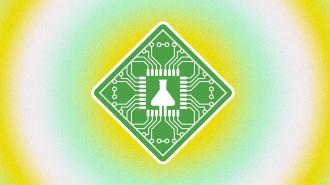AI-driven drug development has hit a new milestone, with Hong Kong-based biotech company Insilico Medicine launching phase 2 trials of a therapy with an AI-discovered target and an AI-designed drug itself.
The challenge: Drug development is a notoriously difficult and expensive process. It starts with identifying a target that plays a key role in the disease. To combat COVID-19, for example, many focused on the spike protein that the virus uses to infect human cells.
Drug development can take more than 10 years and cost more than $2 billion.
Scientists must then determine if a drug could bind to this target. If so, the next step is finding a drug that will bind to it, in a way that’s beneficial to patients, without being toxic. They then have to do lab and animal tests before clinical trials can even begin.
The whole process can take more than 10 years, and only about 12% of the few drug candidates that even reach clinical trials get approved. Counting the money spent on duds, drug developers typically end up paying between $800 million and $2.3 billion on R&D for each new drug they bring to market.
AI-driven drug development: Many drug developers are turning to AI to try to make this process more efficient.
By feeding AI tons of data — scientific papers, drug patents, protein databases, electronic health records, etc. — these systems can identify druggable targets, design drug candidates, and even predict how well drugs will perform in trials.
AI-driven drug development is still new, but we’re already seeing the potential benefits. It usually takes 4.5 years to complete the preclinical stage of development — the stage before human trials — but the first AI-designed drug to reach clinical trials, an OCD med developed by UK startup Exscientia, did it in just one year.
“INS018_055 is the first AI-designed novel molecule for an AI-discovered novel target entered into a clinical trial.”
Feng Ren
First of its kind: Several other AI-developed drugs have now also reached the clinical trial stage, including Insilico Medicine’s INS018_055, which is designed to treat idiopathic pulmonary fibrosis (IPF), a lung disease affecting 5 million people worldwide.
Not only was that drug designed by AI, but the target it acts upon was unknown until Insilico’s AI identified it, making it unique in the world of AI-driven drug development.
“INS018_055 is the first AI-designed novel molecule for an AI-discovered novel target entered into a clinical trial,” said Feng Ren, Insilico’s co-CEO and CSO, when announcing the positive topline results of a phase 1 trial in January 2023.
Looking ahead: No AI-developed drug has made it all the way through clinical trials to approval yet, but Insilico has begun phase 2 trials of INS018_055, dosing the first of what it expects to be several hundred participants in the US and China.
If the drug is ultimately approved, it could be life-changing for people with IPF. The disease causes scarring in the lungs that makes breathing difficult, and the best available treatments can only slow its progression, leading to a median survival after diagnosis of just 3 to 4 years.
“We are eager to continue to advance this potentially first-in-class therapy forward to help patients in need and show the value of generative AI in drug discovery and development,” said Alex Zhavoronkov, Insilico’s co-CEO.
We’d love to hear from you! If you have a comment about this article or if you have a tip for a future Freethink story, please email us at tips@freethink.com.
